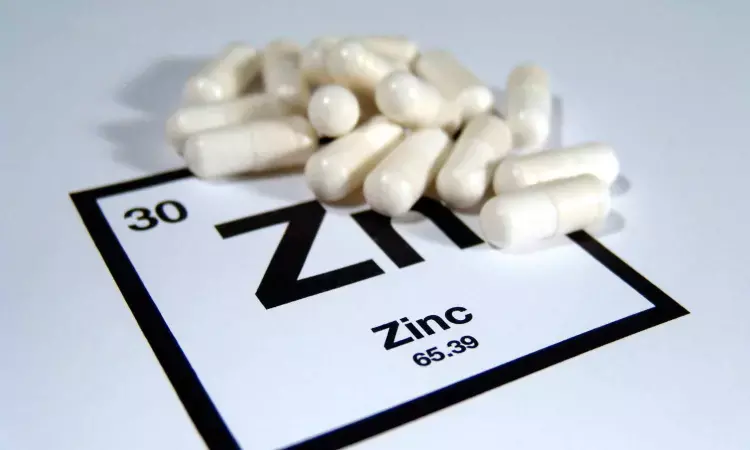- Home
- Medical news & Guidelines
- Anesthesiology
- Cardiology and CTVS
- Critical Care
- Dentistry
- Dermatology
- Diabetes and Endocrinology
- ENT
- Gastroenterology
- Medicine
- Nephrology
- Neurology
- Obstretics-Gynaecology
- Oncology
- Ophthalmology
- Orthopaedics
- Pediatrics-Neonatology
- Psychiatry
- Pulmonology
- Radiology
- Surgery
- Urology
- Laboratory Medicine
- Diet
- Nursing
- Paramedical
- Physiotherapy
- Health news
- Fact Check
- Bone Health Fact Check
- Brain Health Fact Check
- Cancer Related Fact Check
- Child Care Fact Check
- Dental and oral health fact check
- Diabetes and metabolic health fact check
- Diet and Nutrition Fact Check
- Eye and ENT Care Fact Check
- Fitness fact check
- Gut health fact check
- Heart health fact check
- Kidney health fact check
- Medical education fact check
- Men's health fact check
- Respiratory fact check
- Skin and hair care fact check
- Vaccine and Immunization fact check
- Women's health fact check
- AYUSH
- State News
- Andaman and Nicobar Islands
- Andhra Pradesh
- Arunachal Pradesh
- Assam
- Bihar
- Chandigarh
- Chattisgarh
- Dadra and Nagar Haveli
- Daman and Diu
- Delhi
- Goa
- Gujarat
- Haryana
- Himachal Pradesh
- Jammu & Kashmir
- Jharkhand
- Karnataka
- Kerala
- Ladakh
- Lakshadweep
- Madhya Pradesh
- Maharashtra
- Manipur
- Meghalaya
- Mizoram
- Nagaland
- Odisha
- Puducherry
- Punjab
- Rajasthan
- Sikkim
- Tamil Nadu
- Telangana
- Tripura
- Uttar Pradesh
- Uttrakhand
- West Bengal
- Medical Education
- Industry
Zinc supplementation reduces risk factors associated with cardiovascular disease

Iran: A recent study published in the Journal Of Trace Elements In Medicine And Biology has linked zinc to a higher likelihood of developing CVDs when deficient.
Recognized for its anti-inflammatory and anti-oxidative properties, zinc supplementation may hold therapeutic potential in addressing CVDs. Researchers conducted a comprehensive systematic review and meta-analysis to investigate the impacts of zinc supplementation on risk factors associated with CVDs.
The studyby Matin Nazari and team, which analyzed eligible randomized clinical trials (RCTs), sought to evaluate the effects of zinc supplementation on various risk factors for CVDs. The researchers systematically searched electronic databases, including PubMed, Web of Science, and Scopus, up until January 2023 to identify relevant RCTs. The heterogeneity of the trials was assessed, and random effects models were utilized to estimate pooled data, reported as the weighted mean difference (WMD) with a 95% confidence interval (CI).
● From an initial pool of 23,165 records, the meta-analysis included 75 studies that met the inclusion criteria. The pooled findings revealed significant reductions in various risk factors associated with CVDs following zinc supplementation.
● These risk factors included triglycerides (TG), total cholesterol (TC), fasting blood glucose (FBG), Hemoglobin A1C (HbA1C), Homeostatic Model Assessment for Insulin Resistance (HOMA-IR), C-reactive protein (CRP), interleukin-6 (IL-6), Tumor necrosis factor-α (TNF-α), nitric oxide (NO), malondialdehyde (MDA), total antioxidant capacity (TAC), and glutathione (GSH).
● Importantly, the meta-analysis did not observe significant effects of zinc supplementation on low-density lipoprotein (LDL), high-density lipoprotein (HDL), insulin, systolic blood pressure (SBP), diastolic blood pressure (DBP), aspartate transaminase (AST), and Alanine aminotransferase (ALT).
● These findings suggest that zinc supplementation primarily influences key risk factors associated with CVDs, such as lipid profile, blood glucose control, insulin resistance, inflammation, oxidative stress, and antioxidant capacity.
The comprehensive analysis indicates that zinc supplementation may hold promise in reducing recognized risk factors that contribute to the development of CVDs. While the findings are encouraging, further research is needed to corroborate and expand upon these results. Future studies should aim to explore the optimal dosage, duration, and potential interactions with other therapeutic interventions.
Given the widespread prevalence of CVDs and the potential of zinc supplementation to address related risk factors, these findings offer hope for future advancements in cardiac health management. Incorporating zinc supplementation as an adjunct therapy in conjunction with existing treatment approaches may contribute to improved outcomes for individuals at risk of or already diagnosed with CVDs.
It is important to note that individuals should consult with healthcare professionals before initiating any supplementation regimen, as the appropriateness and dosage may vary depending on individual circumstances and existing health conditions.
Reference:
Nazari, M., Ashtary-Larky, D., Nikbaf-Shandiz, M., Goudarzi, K., Bagheri, R., Dolatshahi, S., Omran, H. S., Amirani, N., Ghanavati, M., & Asbaghi, O. (2023). Zinc supplementation and cardiovascular disease risk factors: A GRADE-assessed systematic review and dose-response meta-analysis. Journal of Trace Elements in Medicine and Biology: Organ of the Society for Minerals and Trace Elements (GMS), 79(127244), 127244. https://doi.org/10.1016/j.jtemb.2023.127244
Dr Kamal Kant Kohli-MBBS, DTCD- a chest specialist with more than 30 years of practice and a flair for writing clinical articles, Dr Kamal Kant Kohli joined Medical Dialogues as a Chief Editor of Medical News. Besides writing articles, as an editor, he proofreads and verifies all the medical content published on Medical Dialogues including those coming from journals, studies,medical conferences,guidelines etc. Email: drkohli@medicaldialogues.in. Contact no. 011-43720751


